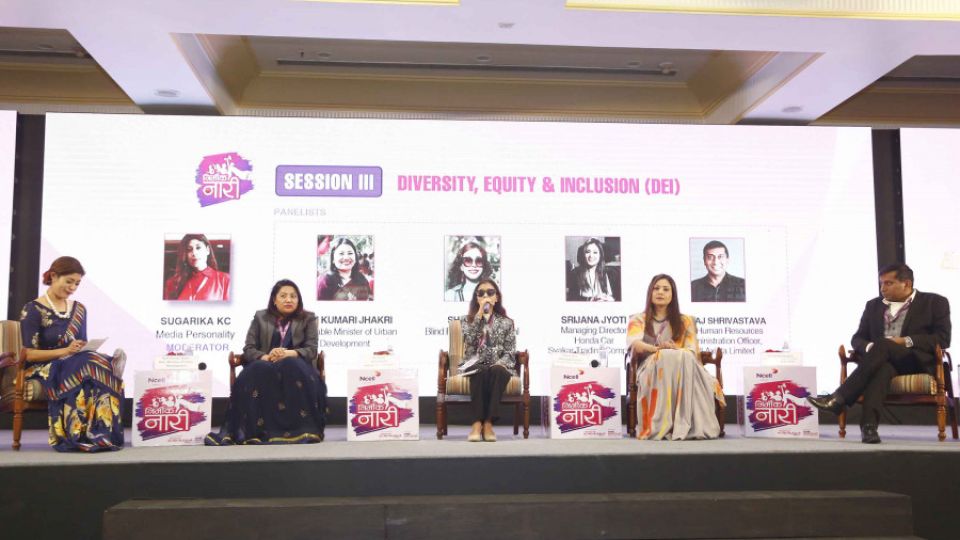April 13, 2022
KATHMANDU – Men still make the financial decisions even though the female literacy rate has been increasing every year, mainly because most women only have formal education and many leave their studies for various reasons.
Speaking on the topic Women and Financial Independence at a programme entitled Nirvik Nari organised by the Kantipur Media Group on Monday, women panellists highlighted the challenges faced by women in being financially independent at the policy and social levels.
Grace Rauniyar, investopreneur of the Nepal Investment Forum, said that women participation in the share market had reached 44 percent which is very good for a country like Nepal.
“But the reality is different. Even though the accounts have been opened in the name of women, they are handled by men,” Rauniyar said.
“In most homes, when it comes to investing in shares or anything, the decision is mostly made by the male members in the family,” Rauniyar said. “Most demat accounts registered in the name of women are handled by men.”
A Nepal Rastra Bank report showed that a record 80,061 women entrepreneurs borrowed Rs73.85 billion in concessional loans from banks and financial institutions in the first six months of the current fiscal year.
The steep jump in the number of women taking loans, which are available at 5 percent interest per annum, is due to the mandatory provision imposed on banks to issue concessional loans to at least 10 women entrepreneurs from each of their branches, the central bank said.
But women entrepreneurs say the figure is too high, and that the report is either misleading or there is something unusual happening, and that men are taking advantage of these concessional loan schemes provided to women.
A World Bank report published in 2020 says that in Nepal, many businesses are registered in the name of women specifically to secure government subsidies given to them.
“Also if we look at women leadership positions in the banking sector, only two of the CEOs in the country’s 27 commercial banks are women,” Rauniyar said.
Durga Rijal, principal of Apex College, said that before starting any entrepreneurship or forwarding process for work, citizenship plays a vital role.
“The provision of citizenship in the Constitution of Nepal has not been implemented,” Rijal said. “The right to obtain citizenship through the mother has not been implemented, the first difficulty in the process of getting one’s identity,” she said
“Women are demotivated and treated differently when they visit different government offices to get their work done while starting a business,” Rijal said. “Government offices should state clearly what documents are required so that paperwork hassles do not discourage women entrepreneurs.”
According to Rijal, formal education is not enough for women. “In our society which still functions under the patriarchy system, it is important to change the thinking process of society to take women to the forefront; and for this, formal education is not sufficient,” she said.
The Financial Access Report 2021 published in August last year by Nepal Rastra Bank showed that male account holders outnumber females by almost two to one.
Among the total 29.92 million account holders in banking and financial institutions, 19.11 million are male and 10.61 million are female, the report showed.
Kohinoor Singh Agrawal, managing director of Kat Queens, Kathmandu and Pokhara Rhinos, said that Nepali women cricket players need to be financially supported to help them improve their performance and make them competitive to play in international matches.
“Women cricket players are investing their own money to make their performance better, but there is no plan or investment from the other side,” Agrawal said. “Nepali women cricketers neither have player supporters nor any brands endorsing them.”
An analytical report on Women in Business published in June last year showed there is still a wide wage gap between female and male workers.
The share of women workers is 58 percent for monthly incomes smaller than Rs7,600. In contrast, the share of women workers is only 12.2 percent for monthly incomes of more than Rs25,000, the report showed.
The women panellists also agreed that when family members support women in the house, it will become easy for them to pursue education or a career.
Kamala Thapa, agency manager at Citizen Life Insurance, said that it becomes difficult to move ahead when women are not financially independent.
“When I became financially independent, I received felicitations from national and international levels,” Thapa said.
A study report entitled “Women, Business and the Law 2022” published in March showed that Nepal made the fastest progress among South Asian countries in closing gender-based gaps, scoring 80.6 points out of 100.
“In recent times, some women have already become financially independent,” Thapa said.
Rauniyar said that the challenges for women might have changed, but there are still many challenges. “Having said that, we have become capable of facing the challenges due to the changing thought process of society, education system and mentorship,” she said.
“Women account for around 40 percent of the staff in broker offices, capital networks and investment companies, but it is still a long way for women to get into leadership positions,” Rauniyar said.
Women entrepreneurs say that they need a human economy for all, not just the fortunate few.


